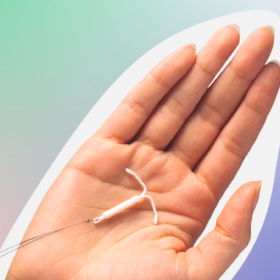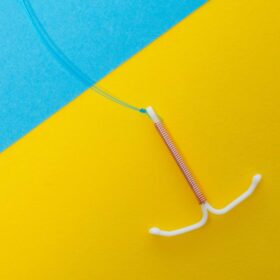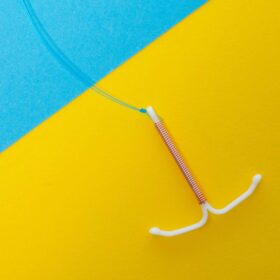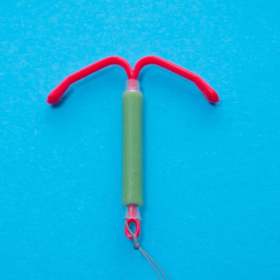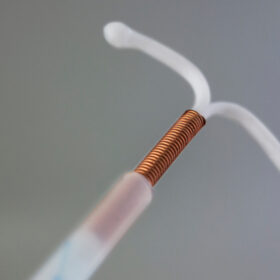
Can contraception cause yeast infections or vaginal itching?
In this article
What's the lowdown?
1 in 3 users of The Lowdown reported vaginal dryness as a side effect of their contraception
Symptoms of vaginal dryness include pain or discomfort in your vagina and uncomfortable sex
The combined pill may cause an increase in discharge
There are many causes of vaginal itching, including thrush and the use of irritating spermicides
What are the symptoms of vaginal dryness?
First things first: while it may seem like an obvious question, how do you know if you have vaginal dryness? The vagina produces normal discharge to keep itself lubricated, so symptoms to look out for include:
- Sore or uncomfortable sex
- Pain or itching in and around the vagina
- Needing to wee more frequently
- Recurrent urinary tract infections (UTIs) or cystitis
What are the causes of vaginal dryness?
The first words that may spring to mind when thinking about vaginal dryness is the menopause, alongside hormones, HRT, and – the star of the show – oestrogen. Kicked off by a change in hormone levels linked to the ovaries and a reduction in the release of oestrogen, the menopause can lead to vaginal dryness.
But the menopause isn’t the only scenario where hormones can be sent a little wild. When it comes to discharge, hormonal contraceptives may upset the balance, and they are listed as a possible cause of vaginal dryness on the NHS website. Research into this is a little thin on the ground, but we do know about the vital role that oestrogen plays in the *ahem* smooth running of the vagina.
Progestogen-only methods of contraception work to prevent pregnancy through the prevention of ovulation (when the ovaries release an egg). It is felt that this lack of ovulation and a decrease in the levels of oestrogen, may cause a reduction in blood flow to the vaginal artery. This, in turn, may result in vaginal dryness and uncomfortable sex due to the effect on vaginal lubrication.
According to reviews left by users of The Lowdown, 1 in 3 experienced vaginal dryness as a result of their contraception. And the worst offenders? The vaginal ring, the combined pill, the injection, the implant, and the progestogen-only pill. Given that all these methods contain hormones, it is perhaps not surprising they are top of the list for dryness as a side effect.
Other causes to consider include:
- Breastfeeding
- Antidepressant medication
- Cancer treatments, for example, chemotherapy
- Having your womb removed (hysterectomy
Can contraceptives help with vaginal dryness?
With the rise in popularity of fertility awareness methods (FAMs), you may already know that changes exist in both consistency and volume of normal discharge throughout your menstrual cycle.
Due to variations in hormone levels, cervical mucus can take different forms depending on the day of your cycle. Oestrogen levels are particularly high around ovulation, and you may notice an increase in discharge at this time.
The combined contraceptive pill contains both progestogen and oestrogen, and this increased level of oestrogen in those taking the combined pill may translate to an increase in discharge. Although as we mentioned earlier users may also experience vaginal dryness!
The Lowdown users have reported discharge as a side effect of hormonal contraceptives, with 51% of those taking the combined pill experiencing this change, varying from “a bit” to “a great deal”.
Causes of vaginal itching
Whilst a healthy vagina shouldn’t be itchy, there can be many possible causes. Finding the culprit quickly means moving on from that niggle-some problem easily.
Common causes of an itchy vagina are:
- Thrush – a common yeast infection caused by the fungus Candida. Other symptoms include a white discharge (often resembling cottage cheese), irritation around the vagina, and stinging during sex and urination.
- STIs – including trichomoniasis, herpes, and pubic lice.
- Contact dermatitis – a skin reaction with a wide range of causes, including irritating spermicides, latex, soaps, or cosmetics.
- Allergic reaction – for example, latex.
- Psoriasis – unlikely to affect the vaginal area alone, psoriasis will most probably be found on other areas of the body if found in the genital area, usually on the vulva. Your GP or dermatologist can advise on the best form of treatment, with many options available.
- Lichen sclerosis – may appear on any area of the body, but most commonly found on the vulva, penis, and anus. Causing white itchy patches, lichen sclerosis is not curable, but steroid creams can help relieve symptoms.
- Vaginal dryness – a possible side effect of hormonal contraception and the menopause, with symptoms of uncomfortable sex, and pain or itching around the vagina.
- Atrophic vaginitis also known as genitourinary syndrome of menopause (GSM) – commonly experienced during and post-menopause as a result of a drop in oestrogen levels, the mucous membrane inside the vagina becomes thinner and drier, resulting in burning, itching and/or vaginal dryness
Can birth control cause vaginal itching and burning?
Maybe, but whilst some people report an itchy vagina, dryness and yeast infections as a side effect of birth control, there isn’t clear evidence to support it yet. Let’s explore further…
Oestogren and vaginal itching
Oh, hormones! From the moment you hit puberty, they just can’t help but poke their noses into different aspects of your life. And combined hormonal contraceptives like to add their two cents to the mix!
Caused by an overgrowth of the fungus Candida, thrush is a common yeast infection that can affect anyone. Research has found that oestrogen may play a key role in the existence of thrush and therefore an itchy vagina. In fact, it may be the case that it cannot occur without it. But what this means for oestrogen in combined contraceptives and its link with thrush remains unclear.
Can the pill make you itchy?
Evidence for higher rates of thrush in women taking the pill is contradictory. Some research suggests switching to the contraceptive injection such as Depo-Provera, which only contains the hormone progestogen, may help those with recurrent yeast infections and vulval itching. However it is not yet clear whether other progestogen-only methods will offer the same benefits.
Over 2 years (2019 to 2021), a quarter of The Lowdown reviewers for the combined contraceptive pill noted thrush and an itchy vag as a side effect. Similarly, 23% of those on the progestogen-only pill experienced thrush whilst using the contraceptive.
You can now buy the mini pill and combined pill, as well as other methods of contraception from the Lowdown. Whether you’re looking for the Hana contraceptive pill, Yasmin combined pill, or something else. Browse our contraception online.
Can the morning after pill cause thrush?
Levonelle and ellaOne are two types of emergency contraceptive pill. Whilst research suggests exposure to oestrogen may be a risk factor for thrush, the morning after pill doesn’t contain this hormone.
Hormonal changes, such as those experienced during pregnancy, may result in thrush. But as for the possibility of the morning after pill causing thrush? The evidence just isn’t there yet.

Can the coil cause yeast infections?
IUDs and vaginal itching
There is evidence to suggest that, yes, the copper coil may be associated with acute or recurrent thrush. Some research has found the yeast infection is able to stick to the IUD, and create what is known as a biofilm – a complex structure protecting the candida from anti-fungal treatment. But whilst the IUD may be a risk factor for thrush, there is not yet any consistent evidence linking the two. However, users who experience recurrent thrush that won’t budge with treatment may wish to discuss switching birth control.
Mirena coil and thrush
Research has also found an increase in Candida present in those with the IUS – the Mirena being a popular example of the hormonal coil – although this has not resulted in a significant change in symptomatic infections of users. So, whilst Candida – which causes thrush – might be more commonly found in those with an IUS (hormonal coil), it does not seem to translate to an increase in symptomatic cases of thrush. It’s therefore unclear if the Mirena Coil can cause thrush.
At the time of writing, 21% of copper coil users at The Lowdown report thrush as a side effects,and funnily enough, 21% of hormonal coil users reported the same!
However, as always, many factors come into play. Thrush is a common yeast infection affecting 75% of women at some point in their lives, so they may have developed thrush without the coil. More research is definitely needed!
What about the vaginal ring?
In a similar result to the study on coils, yeasts were found adhered to the surface of vaginal rings in a study on the vaginal health of users. However, cases of symptomatic thrush were not found to be higher in those using the contraceptive vaginal ring when compared to those using equivalent oral contraceptives.
As for The Lowdown users, 30% experienced thrush whilst using the vaginal ring: the highest percentage for a method of contraception reviewed by our audience, when compared to the mini pill (21%), combined pill (23%), or hormonal IUS (21%).

What to do if your vagina is itchy
Rule number one is to consult a doctor or pharmacist. When noticing anything out of the ordinary, it is always best to seek advice from a medical professional. There are many causes of vaginal itching and so it’s key to find the right one in order to treat the problem effectively. Purchasing a vaginal health swab test kit from ScreenMe is an alternative option. Following a test, ScreenMe offers follow up 1:1 consultations to explain the results and help support you.
Some medical conditions which can affect the vulva and vagina need to be identified, but some may be managed simply with the use of vaginal moisturisers or lubricants. For those going through the menopause, vaginal oestrogen and hormone replacement therapy may also be options.
If you suspect your contraception is to blame, why not book an appointment with one of our amazing doctors here at The Lowdown? They can talk through your symptoms and advise on what you should do next.
If you’d like to leave a review on your experiences with contraception, we’d love to hear from you!
Our medical review process
This article has been medically reviewed for factual and up to date information by a Lowdown doctor.


